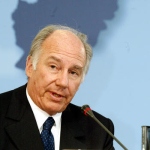The quiet revolutionary 1991-08-18
The quiet revolutionary
By Akbar S. Ahmed
The (Manchester) Guardian Weekly, August 18, 1991
Picture caption: The Aga Khan: paradox
The central issue facing Muslims in the world today is what to do with the part that is non-Muslim. It will dominate their political agenda in the 1990s. Two opposed arguments meet head on. One rejects the modern world as dominated by the West, as corrupt and evil; the other wishes to live with it while retaining its own sense of identity. If the media are to be believed, the former is in the ascendant. For the latter one of the most interesting and important voices to emerge recently is that of the Aga Khan.
Here is irony. For the Aga Khan is the head, the hereditary Imam, of the Ismailis, one of the most close-knit and traditional Muslim sects. More irony, as this soft-spoken, even shy, person is bringing about a quiet but far-reaching economic and social revolution in the lives of his followers. Final irony: his work now brings together Ismailis and non-Ismailis as never before in history and thus provides a lead to mainstream Muslims, too many of whom consider the sect unorthodox.
In the West the name Aga Khan is synonymous with fabulous riches, exotic, Oriental mystery. What seldom comes to light is the serious work performed in the last decade by the present holder of the title to relate Islamic ideas to contemporary life. For him, Islamic architecture is a symbol of the best in Islamic history and through it he is expressing a philosophy. The architecture's grandeur, symmetry and nobility help create a sense of pride and identity among Muslims. From the brand new Serena Hotel in Quetta, Pakistan, to the Serena in Zanzibar, housed in a restored building, he encourages synthesis between past and present.
His projects are spread from Indonesia to Morocco but the ideas are generated from the Aga Khan Programme for Architecture in MIT-Harvard and the Trust in Geneva. Architecture is just one activity. The British Overseas Development Agency has acknowledged with cash backing the worthiness of his project for rural development in northern Pakistan.
Because of his great personal prestige the Aga Khan is able to attract the support of heads of state and royalty; his education at Harvard, to which he is constantly drawn, keeps open international academic networks. He shuns personal publicity but he has no need to beat his drum. Directly descended from the Holy Prophet, he became the Imam in 1957 at the age of 20, the 49th in the line.
I interviewed him in Granada where, with the King of Spain, he recently inaugurated the medieval Zafra House. Restored by the Aga Khan, it henceforth will be the Centre of Historical Studies in Granada. Its arches, calligraphy, courtyard and fountain tell of an age of Islamic artistic glory. This is especially poignant just when Spain prepares to commemorate the 500th anniversary of the fall of Granada and the expulsion of the Muslims in 1492.
He talks of the loss of vigour, the drying-up of initiative, the emphasis on empty dogma as causes of the downfall here. There are parallels today: "Those who wish to introduce the concept that you can only practice your faith as it was practised hundreds of years ago are introducing a time dimension which is not part of our faith today. It is a very delicate issue, whether it is in science, in medicine, in economics."
He worries that the Western media tend to depict Muslims negatively. "I find the Western media difficult to deal with, essentially because their agenda is very different. This agenda is enterprise first. When you look at enterprise in the Western world, they are not looking at the ethics or the future of the Muslim world. So ours is not a priority issue."
And the West simply cannot ignore Islam: "With Islam encompassing such a large area of the world with significant populations, Western society can no longer survive in its own interest by being ill-informed or misinformed about the Islamic world. They have to get away from the concept that every time there is a bush fire, or worse than that, it is representative of the Islamic world. So long as they make it representative they damage both themselves and their relations with the Islamic world itself because they are sending erroneous messages back. There is where I would call a 'knowledge vacuum'. It is hurting everyone.
In our divided world, he said, "it is more important than ever for us to know who we are, from where we are coming and where we are going. Questions of identity and cultural interdependence have become the focus of public agenda throughout the world. The tragic events of the past year around the Gulf have illustrated sadly and depressingly the misunderstandings and misperceptions which affect us all."
The Aga Khan's talk of "humanism" and "tolerance" in Islam reminds both Muslims and non-Muslims of its essentially compassionate and universalist nature. In an age in which Muslims tend to be polarised, this itself is a radical position.
Professor Akbar Ahmed is the Allama Iqbal Fellow and Fellow of Selwyn College at the University of Cambridge. Excerpts of this article appear in hid book: "Postmodernism and Islam: Predicament and Promise", pp. 203-204
- 4190 reads

